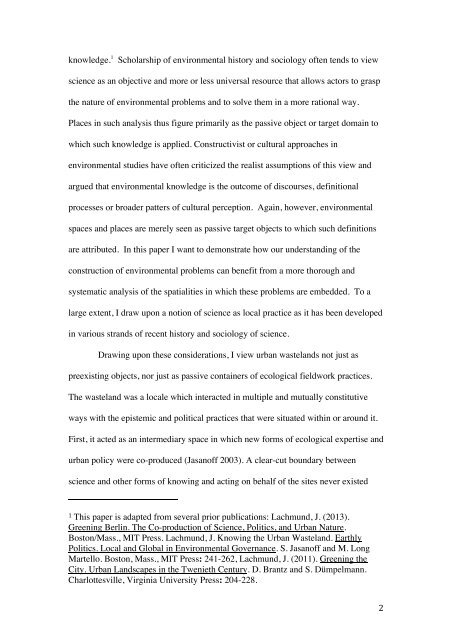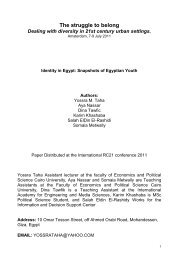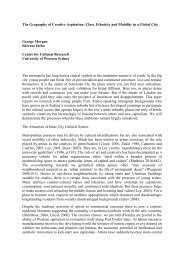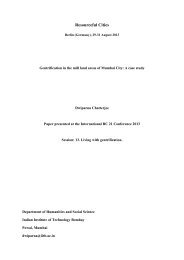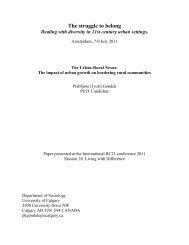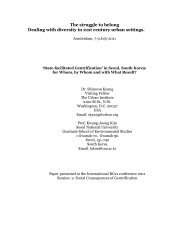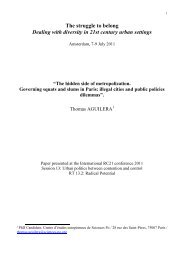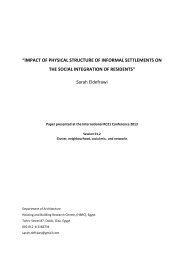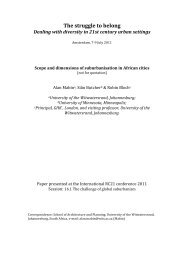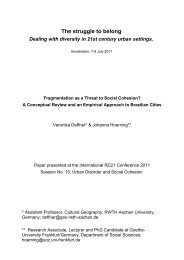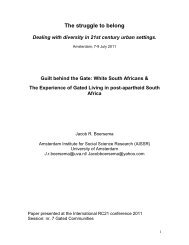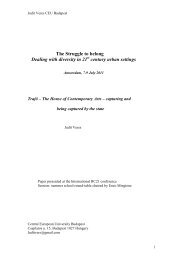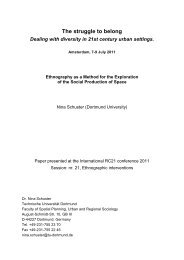The Invention of the Ruderal Area. Urban Ecology and the Struggle ...
The Invention of the Ruderal Area. Urban Ecology and the Struggle ...
The Invention of the Ruderal Area. Urban Ecology and the Struggle ...
You also want an ePaper? Increase the reach of your titles
YUMPU automatically turns print PDFs into web optimized ePapers that Google loves.
knowledge. 1<br />
Scholarship <strong>of</strong> environmental history <strong>and</strong> sociology <strong>of</strong>ten tends to view<br />
science as an objective <strong>and</strong> more or less universal resource that allows actors to grasp<br />
<strong>the</strong> nature <strong>of</strong> environmental problems <strong>and</strong> to solve <strong>the</strong>m in a more rational way.<br />
Places in such analysis thus figure primarily as <strong>the</strong> passive object or target domain to<br />
which such knowledge is applied. Constructivist or cultural approaches in<br />
environmental studies have <strong>of</strong>ten criticized <strong>the</strong> realist assumptions <strong>of</strong> this view <strong>and</strong><br />
argued that environmental knowledge is <strong>the</strong> outcome <strong>of</strong> discourses, definitional<br />
processes or broader patters <strong>of</strong> cultural perception. Again, however, environmental<br />
spaces <strong>and</strong> places are merely seen as passive target objects to which such definitions<br />
are attributed. In this paper I want to demonstrate how our underst<strong>and</strong>ing <strong>of</strong> <strong>the</strong><br />
construction <strong>of</strong> environmental problems can benefit from a more thorough <strong>and</strong><br />
systematic analysis <strong>of</strong> <strong>the</strong> spatialities in which <strong>the</strong>se problems are embedded. To a<br />
large extent, I draw upon a notion <strong>of</strong> science as local practice as it has been developed<br />
in various str<strong>and</strong>s <strong>of</strong> recent history <strong>and</strong> sociology <strong>of</strong> science.<br />
Drawing upon <strong>the</strong>se considerations, I view urban wastel<strong>and</strong>s not just as<br />
preexisting objects, nor just as passive containers <strong>of</strong> ecological fieldwork practices.<br />
<strong>The</strong> wastel<strong>and</strong> was a locale which interacted in multiple <strong>and</strong> mutually constitutive<br />
ways with <strong>the</strong> epistemic <strong>and</strong> political practices that were situated within or around it.<br />
First, it acted as an intermediary space in which new forms <strong>of</strong> ecological expertise <strong>and</strong><br />
urban policy were co-produced (Jasan<strong>of</strong>f 2003). A clear-cut boundary between<br />
science <strong>and</strong> o<strong>the</strong>r forms <strong>of</strong> knowing <strong>and</strong> acting on behalf <strong>of</strong> <strong>the</strong> sites never existed<br />
1 This paper is adapted from several prior publications: Lachmund, J. (2013).<br />
Greening Berlin. <strong>The</strong> Co-production <strong>of</strong> Science, Politics, <strong>and</strong> <strong>Urban</strong> Nature.<br />
Boston/Mass., MIT Press. Lachmund, J. Knowing <strong>the</strong> <strong>Urban</strong> Wastel<strong>and</strong>. Earthly<br />
Politics. Local <strong>and</strong> Global in Environmental Governance. S. Jasan<strong>of</strong>f <strong>and</strong> M. Long<br />
Martello. Boston, Mass., MIT Press: 241-262, Lachmund, J. (2011). Greening <strong>the</strong><br />
City. <strong>Urban</strong> L<strong>and</strong>scapes in <strong>the</strong> Twenieth Century. D. Brantz <strong>and</strong> S. Dümpelmann.<br />
Charlottesville, Virginia University Press: 204-228. <br />
<br />
2


